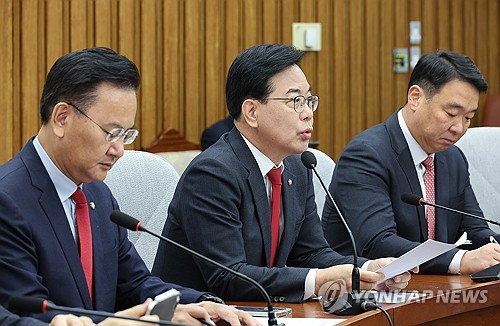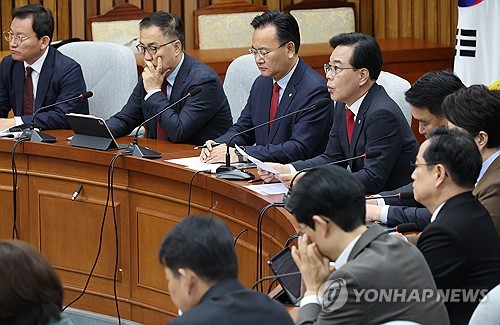(Seoul=Yonhap Infomax) Da Ye On Ondaye – Song Eon-seok, floor leader of the People Power Party, expressed concern that the recent surge in the dollar-won exchange rate to the 1,470 range could further squeeze South Korea's already subdued domestic demand.

At a party strategy meeting at the National Assembly on the 21st, Song stated, "Serious warning signals are reverberating across the South Korean economy, most notably the normalization of a high exchange rate environment."
He explained, "A high exchange rate leads to increased costs for essential imports, particularly energy such as heating and electricity during the winter, which in turn further suppresses domestic demand and ultimately intensifies upward pressure on interest rates."
Song continued, "Against this backdrop, next year's budget proposal represents an unprecedented expansionary fiscal policy, with both total expenditures and government bond issuance reaching record highs. This will inevitably increase the money supply and inflation, further amplifying pressure for higher interest rates."
He emphasized, "For this reason, hard-earned taxpayer money must be focused on stabilizing livelihoods and fostering future growth engines. Rather than prioritizing so-called 'noble unions' and political deals—such as the 5.5 billion won ($4.2 million) in rental deposit support for the Korean Confederation of Trade Unions—resources should be directed toward advanced technology investment and future strategies."
Song also criticized the special activity budget of the Lee Jae-myung administration, calling it "a case of double standards."
He said, "They once claimed the government could function well without special activity funds and cut them entirely, but upon taking power, they fully restored the budget. This is a deceptive attitude that insults the public. What South Korea needs now is not a budget for rewarding election supporters, but one that revitalizes the economy and supports people's livelihoods."

Kim Eun-hye, deputy floor leader for policy, also criticized the government's record 728 trillion won ($555 billion) budget proposal for next year.
Kim said, "The 2026 budget proposal makes the Lee Jae-myung administration's intentions clear: it is declaring, for the first time since the founding of the Republic, that it will abandon fiscal management by running a deficit exceeding 4% of GDP for four consecutive years."
She added, "This means creating over 100 trillion won ($76 billion) in new debt each year. Our children will be saddled with hundreds of millions of won in debt per person."
Jo Jung-hoon, a member of the Special Committee on Budget and Accounts, remarked, "Upon reviewing the Lee Jae-myung administration's budget, three key features stand out: showcase artificial intelligence (AI) projects, government-controlled funds, and election-oriented cash handouts."
Jo specifically criticized the government's AI budget, stating, "There are over 700 AI projects spread across 41 ministries, with no clear project details or precise names. The lack of concrete output metrics or policy objectives means tens or hundreds of billions of won are being distributed to each ministry under the banner of building an AI powerhouse. This mirrors the solar energy budget under the Moon Jae-in administration."
dyon@yna.co.kr
(End)
Copyright © Yonhap Infomax Unauthorized reproduction and redistribution prohibited.

